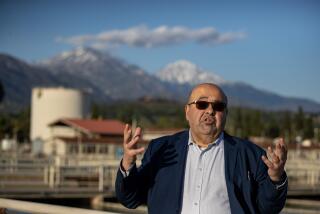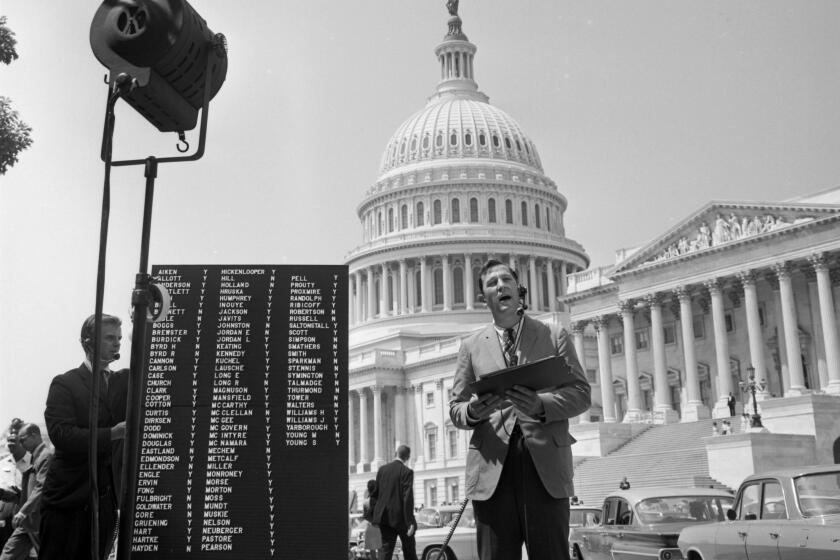Editorial: Adel Hagekhalil would be one good step forward for the MWD. Better transparency would be another

Adel Hagekhalil is an inspired choice to be the next general manager of the Metropolitan Water District of Southern California, the agency that delivers the water ultimately used by half of the state’s population. He’s an engineer, a consensus builder and a champion of the movement to integrate management of different types of water — drinking water, wastewater, stormwater, environmental water — in order to reduce costs and use precious resources more efficiently. He may be exactly what the MWD needs at this point in its history, as it struggles to redefine itself as a supplier of liquid assets not just from distant mountains and rivers, but from recycled urban wastewater.
But here’s the problem: Is Hagekhalil (currently head of the L.A. city Bureau of Street Services) actually the MWD board’s choice? As reported in The Times, the board selected Hagekhalil earlier this year in an extremely close vote, but nothing that this massive water wholesaling agency does is ever that simple or that final. The MWD is notorious for its labyrinthine governance rules and lack of transparency. In the instance at hand, board and staff members who would prefer a more traditional water manager and less innovative water policies are working hard to achieve a different outcome in a second vote, scheduled for next week.
In a masterstroke of irony, some MWD insiders are arguing that the first vote — in which Hagekhalil reportedly achieved a razor-thin majority of 50.42% — is invalid precisely because the results were made known to the public. In other words, the board kept the outcome a secret, yet The Times reported it anyway, so some member of the board must have leaked the results, and therefore, under a disclosure exception in California’s open meeting law, the vote is invalid.
Without getting too far down in the weeds of said law (the Ralph M. Brown Act of 1953, as amended), it’s time for the MWD to focus its attention on its ultimate constituents: the 20 million Californians who pay the bills to the cities and other water districts and agencies represented on the board.
Until now, the agency has tended to see the public as its customers, and of course that’s correct — but the public is also really, if indirectly, both the MWD’s constituents and its owners. As taxpayers as well as ratepayers, they could be on the financial hook for the board’s decisions. That gives them a direct interest in MWD business beyond being simply consumers. They have a stake as Californians who want to see their natural environment protected, their water conserved and their costs under control.
They also have a stake in the agency’s internal processes, including the treatment of women and people of color in the workforce who, as reported in another Times article, have complained of harassment and discrimination.
Representation and voting power on the MWD board is weighted by the size of the city or agency member. The largest single member is the city of L.A., with five mayoral appointees. But the city’s power has been blunted in recent decades by an odd lack of accord among those appointees (they notoriously split 3 to 2 on whether to move ahead with a tunnel project to alter the flow southward of water from the Sacramento-San Joaquin River Delta) and by an acrimonious dispute with the next biggest faction, San Diego.
But the L.A. members have been on the same page in recent votes, and they and San Diego do see eye-to-eye on a more modern water system that relies less on imports and more on developing local supplies through recycling and other innovations. They are joined by more progressive-oriented small water agencies, and together their thinking represents roughly half of the MWD board, meaning many close votes and lots of lobbying and pressure applied to, especially, the smaller agencies.
If Hagekhalil’s selection is finalized, as it should be, he will have far more on his plate than water policy. He should make it a priority to improve the MWD’s relationship with the public and enhance its transparency. If he can pull that off, the more forward-looking water policies that conserve resources and public costs just might fall into place on their own.
More to Read
A cure for the common opinion
Get thought-provoking perspectives with our weekly newsletter.
You may occasionally receive promotional content from the Los Angeles Times.






